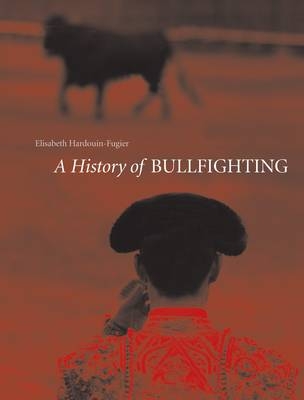
Bullfighting
A Troubled History
Seiten
2009
Reaktion Books (Verlag)
978-1-86189-518-9 (ISBN)
Reaktion Books (Verlag)
978-1-86189-518-9 (ISBN)
- Titel ist leider vergriffen;
keine Neuauflage - Artikel merken
Bullfighting is the only art in which the artist is in danger of death and in which the degree of brilliance in the performance is left to the fighter's honour. Though opinions are divided, one thing is certain bullfighting sparks passionate responses. This title explores the long history of killing bulls as public spectacle.
Bullfighting is the only art in which the artist is in danger of death and in which the degree of brilliance in the performance is left to the fighter's honour', wrote Ernest Hemingway in "Death in the Afternoon". Art? Ritual? Sport? Cruelty? Though opinions are divided, one thing is certain bullfighting sparks passionate responses. Supporters argue that bullfighting is a culturally important tradition stretching back thousands of years, while animal rights groups argue that it is cruel and barbaric, causing unnecessary suffering to both bulls and horses. In "Bullfighting", Elisabeth Hardouin-Fugier brings clarity to this debate through an exploration of the long history of killing bulls as public spectacle. The author shows how in the late 1700s bullfights became mass leisure activities, with paying spectators packing into arenas the classic bullfight of popular imagination. It was at this time that bullfights became lucrative and the bullfighter became a celebrity.
The first cross-cultural study of its kind, "Bullfighting" also relates the regional variations of style throughout Europe and Latin America: in the Basque-Navarre style of bullfighting, for example, the bullfighters wear street clothes, the fight is unstructured, and the bull is not injured; in Spanish-style bullfighting the fighters wear elaborate costumes, the fight is highly ritualized, and the bull is usually killed. In this vivid and comprehensive history, Hardouin-Fugier explores the extensive influence of the bullfight on art, literature and culture, from the paintings of Goya to the writings of Georges Bataille. Enriched with many fascinating and sometimes disturbing illustrations, "Bullfighting" presents a discerning and intelligent approach to this highly colourful yet deeply divisive practice.
Bullfighting is the only art in which the artist is in danger of death and in which the degree of brilliance in the performance is left to the fighter's honour', wrote Ernest Hemingway in "Death in the Afternoon". Art? Ritual? Sport? Cruelty? Though opinions are divided, one thing is certain bullfighting sparks passionate responses. Supporters argue that bullfighting is a culturally important tradition stretching back thousands of years, while animal rights groups argue that it is cruel and barbaric, causing unnecessary suffering to both bulls and horses. In "Bullfighting", Elisabeth Hardouin-Fugier brings clarity to this debate through an exploration of the long history of killing bulls as public spectacle. The author shows how in the late 1700s bullfights became mass leisure activities, with paying spectators packing into arenas the classic bullfight of popular imagination. It was at this time that bullfights became lucrative and the bullfighter became a celebrity.
The first cross-cultural study of its kind, "Bullfighting" also relates the regional variations of style throughout Europe and Latin America: in the Basque-Navarre style of bullfighting, for example, the bullfighters wear street clothes, the fight is unstructured, and the bull is not injured; in Spanish-style bullfighting the fighters wear elaborate costumes, the fight is highly ritualized, and the bull is usually killed. In this vivid and comprehensive history, Hardouin-Fugier explores the extensive influence of the bullfight on art, literature and culture, from the paintings of Goya to the writings of Georges Bataille. Enriched with many fascinating and sometimes disturbing illustrations, "Bullfighting" presents a discerning and intelligent approach to this highly colourful yet deeply divisive practice.
Elisabeth Hardouin-Fugier is Professor of Art History at the Universite Jean-Moulin in Lyon. She is the author of many books, including A History of Floral Painting (1992), A History of French Still Life in the Nineteenth Century (1998) and, with Eric Baratay, the acclaimed Zoo: A History of Zoological Gardens in the West (Reaktion, 2004).
| Übersetzer | Sue Rose |
|---|---|
| Verlagsort | London |
| Sprache | englisch |
| Maße | 190 x 250 mm |
| Themenwelt | Sachbuch/Ratgeber ► Sport ► Reiten / Pferde |
| Geschichte ► Teilgebiete der Geschichte ► Kulturgeschichte | |
| ISBN-10 | 1-86189-518-6 / 1861895186 |
| ISBN-13 | 978-1-86189-518-9 / 9781861895189 |
| Zustand | Neuware |
| Informationen gemäß Produktsicherheitsverordnung (GPSR) | |
| Haben Sie eine Frage zum Produkt? |
Mehr entdecken
aus dem Bereich
aus dem Bereich
der stille Abschied vom bäuerlichen Leben in Deutschland
Buch | Hardcover (2023)
C.H.Beck (Verlag)
CHF 32,15
vom Mittelalter bis zur Gegenwart
Buch | Softcover (2024)
C.H.Beck (Verlag)
CHF 16,80


